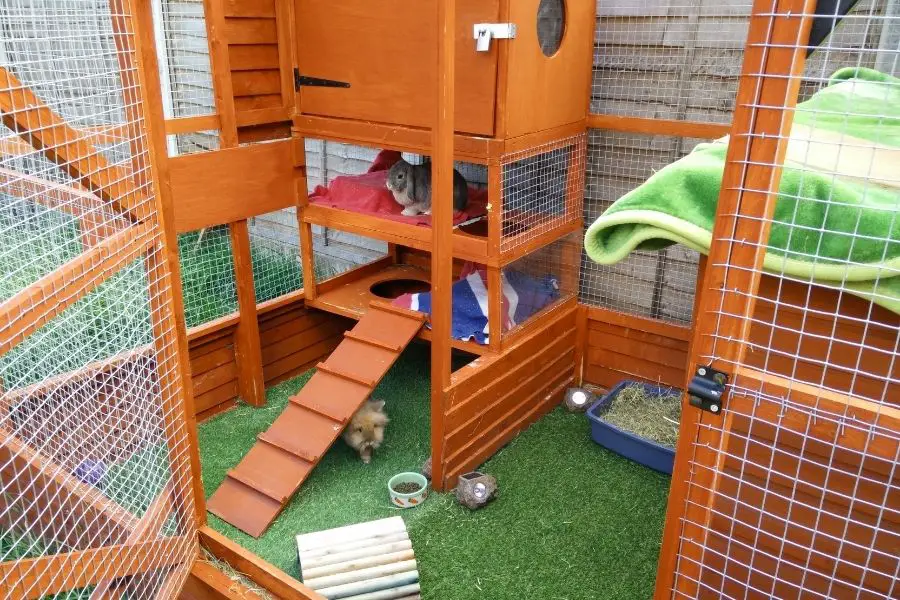How do you protect rabbits from predators? It’s a question that every rabbit owner has likely pondered. Whether you’re a new bunny parent or a seasoned rabbit aficionado, it’s an important issue that needs addressing.
Protecting rabbits from predators involves a combination of strategies. It includes creating safe indoor and outdoor environments, understanding predator behavior, using natural deterrents, and ensuring regular vet visits for your bunnies.
Introduction
This blog post delves deeper into this topic, providing a comprehensive guide on safeguarding our furry friends from predatory threats.
As we move forward, we will dissect the various risks that rabbits face and the best preventative measures you can take.
From constructing predator-proof enclosures to understanding the role of spaying and neutering, we aim to cover all the bases.
We will also explore additional precautions, like how to manage stress in rabbits after a predator scare, ensuring you’re well-equipped to protect your rabbits.
Remember, our goal here is not just to keep the predators out but also to ensure a happy, healthy life for your rabbit.
Understanding the Threat
Who exactly are the predators we’re talking about? A broad spectrum of creatures pose threats to rabbits. If you’re living in rural areas, the culprits could be foxes, weasels, or birds of prey.

In the countryside, badgers and stoats might pose a danger. Urban dwellers aren’t off the hook either, with domestic cats and dogs, and even the occasional raccoon making the list.
Every predator has its own hunting style, which can influence how we protect our rabbits. Some predators are opportunistic and will attack rabbits when presented with an easy chance, while others are more strategic, stalking their prey before making a move.
The Impact of Location
Your location plays a significant role in determining the kinds of predators your rabbits might face. As mentioned earlier, in urban landscapes, the threat often comes from pets like cats and dogs.
These seemingly harmless animals can be a threat when left unsupervised around rabbits.
In rural settings, the danger escalates with predators like foxes and birds of prey. These predators are equipped with the skills to overcome standard barriers and defenses.

But don’t worry – our upcoming sections will arm you with the knowledge to keep these predators at bay, no matter your location.
As we gain a deeper understanding of these threats, it becomes clear that protecting our bunnies isn’t just about erecting physical barriers.
It’s also about understanding the behavior of these predators and using this knowledge to our advantage.
Identifying Signs of Predators
Before we can protect our rabbits, we need to know if a threat is present. One of the easiest ways to do this is by looking for physical signs of predators.
These can range from paw prints and feathers to droppings and fur left behind near your rabbit’s enclosure.
Remember, each predator leaves behind unique traces. For instance, foxes leave distinctive prints that look like a dog’s but are narrower, while the presence of feathers might indicate a bird of prey.
Learning how to identify these signs can help alert you to the presence of a potential threat.
Understanding Rabbit Behavior
Our rabbits themselves can be invaluable indicators of danger. Rabbits are prey animals, and they exhibit certain behaviors when they sense a predator nearby.
This might include thumping their hind legs, hiding, or demonstrating unusual aggression.
In contrast, a relaxed rabbit will be out and about, happily munching on food or exploring its surroundings.
If you observe your rabbit acting unusually skittish, it might be sensing a threat that you haven’t picked up on yet.

Being aware of these signs is crucial in preempting potential threats. But what’s more important is taking the right steps once you know a predator is near.
Essential Steps on How to Protect Rabbits from Predators
Keeping Rabbits Indoors: The First Line of Defense
Choosing to keep your rabbits indoors is one of the most straightforward ways to protect them from predators. Within the safe confines of your home, the likelihood of encountering predators drastically drops.

However, keeping rabbits indoors doesn’t mean letting them roam freely all the time. You still need to create a safe space for them, preferably a spacious pen or an indoor cage with ample room to hop around, eat, sleep, and play.
This ensures they have their own territory and prevents them from chewing on dangerous household items.
Building a Predator-Proof Outdoor Enclosure
If your rabbits spend time outdoors, it’s crucial to have a secure enclosure. The materials used should be robust and durable, strong enough to withstand a predator’s attempts to breach it.
Additionally, ensure that the cage has a solid floor and roof to protect your bunnies from burrowing predators and birds of prey.
A safe outdoor enclosure isn’t just about having strong walls. The locking mechanism should be secure and tamper-proof.

This might seem like an unnecessary detail, but remember, some predators like raccoons are notoriously clever at opening latches.
Providing Safe Outdoor Playtime
Rabbits love frolicking in the grass, but an open yard is like a welcome sign to predators. This doesn’t mean outdoor playtime is off the table, though.
The key is supervision – never leave your bunnies unattended when they’re out and about.
You can also consider a secure outdoor playpen. These are usually lightweight and easy to move, making them ideal for supervised playtime.
Choose one that has a top to protect against aerial predators and is sturdy enough to withstand ground-level threats.

The Role of Neutering/Spaying
Believe it or not, spaying or neutering your rabbits can make them less vulnerable to predators. Unaltered rabbits tend to exhibit more aggressive or adventurous behavior, making them potential targets.
After neutering or spaying, rabbits typically become more docile and are less likely to venture too far from safety.
Besides, altering your rabbits also has numerous health benefits, contributing to their overall well-being.
Utilizing Natural Deterrents
Certain plants, such as lavender and marigolds, are known to deter common predators. Planting these around your rabbit’s outdoor area can create a natural barrier.
Another option is motion-activated sprinklers, which can scare away potential threats.
Keep in mind, though, that while these deterrents can be effective, they should not be your sole line of defense. Instead, consider them as part of a larger, comprehensive strategy to protect your rabbits.
Benefits of Predator Guards and Alarms
Installing predator guards or alarms is another way to fortify your rabbits’ space. These devices emit sounds or lights when triggered, scaring off the predator and alerting you to the danger.
As useful as these tools may be, they are supplementary measures. They can provide an extra layer of protection but should not replace the need for secure enclosures and vigilant supervision.
Having a wide array of defensive strategies is crucial, and it’s important to tailor them to the specific needs of your rabbits and the types of predators in your area.
With the right combination of measures in place, you can create a safe haven for your bunnies.
Additional Precautions
Regular Vet Check-ups
Healthcare plays an important role in predator defense. A healthy rabbit is more likely to avoid and escape from predators.
Regular vet visits ensure your rabbits are in top shape, detecting potential health issues early on and treating them before they can affect your bunny’s overall fitness.

Vet check-ups also present an opportunity to discuss any concerns you may have about predators. Vets are often knowledgeable about local wildlife and can provide additional guidance on keeping your rabbits safe.
Stress Management in Rabbits
Even with all the precautions, rabbits can still sense predators nearby, causing them stress. Chronic stress can lead to various health issues, including weakened immune systems, making rabbits even more susceptible to threats.
Observing your rabbit’s behavior closely, providing comfort items like chew toys, or even considering professional help from an animal behaviorist can assist in managing stress levels in rabbits.
This ensures that even if a predator is nearby, your rabbit can remain as calm as possible.
Understanding Your Rabbit’s Natural Defenses
Rabbits have their own set of natural defenses against predators. They’re fast and agile, which can help them escape from a risky situation.
Understanding these behaviors can aid in the design of your rabbit’s environment.
For instance, providing enough space for your rabbits to run and hide if they feel threatened can capitalize on their natural instincts.
This approach, coupled with your protection measures, can be quite an effective way to keep threats at bay.
Education and Awareness
Finally, never underestimate the power of education. Learn about your local wildlife and the specific threats they may pose. Understanding predator behaviors can assist you in implementing more effective strategies.
Stay updated with the latest research and strategies on rabbit care and predator defense. Connect with other rabbit owners and join local or online groups to share experiences and tips.
By taking these additional precautions, you are not only creating a safe environment for your rabbits but also ensuring their overall well-being.
Comprehensive protection goes beyond physical safety measures. It’s about cultivating a holistic approach that addresses all potential risks and promotes a high quality of life for your furry friends.
Remember, the goal is not just to protect, but to create a space where our rabbits can live happily and healthily.
Conclusion
Rabbits bring a unique joy to our lives. Their playful hops, soft fur, and charming personalities are a constant source of happiness. It’s only fair that we do our utmost to ensure their safety and well-being.
Armed with the right knowledge and tools, we can indeed create a safe and happy environment for our bunnies.
We can strike a balance between allowing them to express their natural behaviors and ensuring they’re protected from potential threats.
The journey to safeguarding our rabbits is an ongoing one, filled with learning and adapting, but every step we take brings us closer to providing the best life for our furry friends.
And that is a task worth pursuing.
May your journey in rabbit care continue to be rewarding, as you explore new ways to keep your bunnies safe, healthy, and joyful.
Because ultimately, isn’t that what we all strive for? To see our rabbits content, living life to its fullest, and returning to us the love and care we’ve bestowed upon them.
Frequently Asked Questions
What are common predators of rabbits in the wild?
Foxes, birds of prey, raccoons, dogs, cats, and weasels are among the most common predators of rabbits in the wild.
Can rabbits recognize their owners?
Rabbits are indeed capable of recognizing their owners. They form strong bonds and can recognize their owners’ voices, scents, and presence.
How can I make my rabbit’s outdoor enclosure safer?
To enhance your rabbit’s outdoor enclosure safety, use robust materials, include a solid floor and roof, secure the latch mechanism, and consider adding predator guards or alarms.
What behaviors do rabbits exhibit when they sense a predator?
Rabbits typically react to predators by thumping their hind legs, hiding, or demonstrating unusual aggression. They may also exhibit increased alertness.
How often should I take my rabbit for a vet check-up?
Rabbits should typically have a vet check-up at least once a year, although more frequent visits may be necessary for older rabbits or those with ongoing health conditions.
